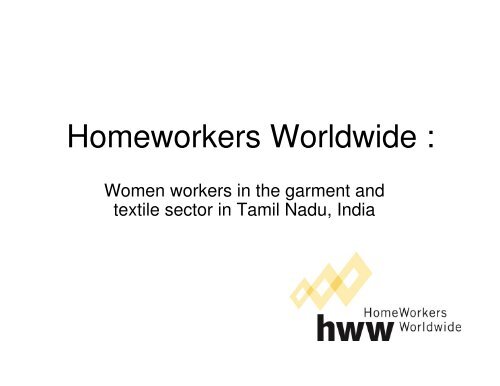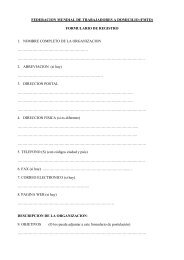Women workers in the garment and textile sector in Tamil Nadu, India
Women workers in the garment and textile sector in Tamil Nadu, India
Women workers in the garment and textile sector in Tamil Nadu, India
You also want an ePaper? Increase the reach of your titles
YUMPU automatically turns print PDFs into web optimized ePapers that Google loves.
A <strong>garment</strong> factory, Tirupur. It is virtually impossible to getpictures <strong>in</strong>side sumangali <strong>and</strong> camp labour factories.
Home<strong>workers</strong> Worldwide (HWW) are work<strong>in</strong>g withpartners <strong>in</strong> <strong>Tamil</strong> <strong>Nadu</strong>, South <strong>India</strong>:READ Foundation, <strong>in</strong> Pudukkottai -RuralEducation <strong>and</strong> DevelopmentSAVE, <strong>in</strong> Tirupur -Social Awareness <strong>and</strong> VoluntaryEducationThis work is part of a <strong>Women</strong> Work<strong>in</strong>g Worldwide (WWW)DfID RAGS scheme: improv<strong>in</strong>g conditions for women<strong>workers</strong> <strong>in</strong> <strong>garment</strong> <strong>sector</strong>: <strong>India</strong>, Bangladesh <strong>and</strong> Lesotho.
Plann<strong>in</strong>g workshop, May 2011, <strong>Tamil</strong> <strong>Nadu</strong>
Focus: Unorganised women <strong>workers</strong> <strong>in</strong> <strong>the</strong> export <strong>garment</strong><strong>and</strong> <strong>textile</strong> <strong>sector</strong> <strong>in</strong> <strong>Tamil</strong> <strong>Nadu</strong>.Young women <strong>workers</strong> work<strong>in</strong>g <strong>in</strong> <strong>garment</strong> factories<strong>and</strong> sp<strong>in</strong>n<strong>in</strong>g mills <strong>in</strong> Tirupur <strong>and</strong> surround<strong>in</strong>g areas -READ <strong>in</strong> Pudukkottai<strong>Women</strong> <strong>workers</strong> <strong>in</strong> <strong>in</strong>formal homebased workshops<strong>and</strong> home<strong>workers</strong> <strong>in</strong> some areas of Tirupur - SAVEAim: To raise awareness <strong>and</strong> develop organisation amongwomen <strong>workers</strong>, with focus on women’s leadershipGeneral Profile: No labour rights or union organisation
Map of <strong>Tamil</strong> <strong>Nadu</strong>Taken from SOMOCaptured by CottonReport, 2011
Informal homebased workshop, Tirupur
Sumangali <strong>and</strong> Camp LabourSumangali: young women <strong>workers</strong> 14-20 years old, recruitedfor fixed period; wages not paid <strong>in</strong> full with lump sum at end ofcontract, usually 3 years, for “marriage expenses”. Declaredillegal by <strong>in</strong>terim order of <strong>the</strong> Madras High Court.Camp labour: similar to sumangali except that <strong>the</strong>re is no fixedcontract or lump sum.In both systems, young women are recruited from distant ruralareas <strong>and</strong> live <strong>in</strong> company-controlled hostels.Campaign<strong>in</strong>g <strong>in</strong> <strong>India</strong> has exposed both systems as violat<strong>in</strong>ghuman <strong>and</strong> labour rights: sumangali - a form of bonded labour,both have elements of forced labour.
‘The work is heavy <strong>and</strong> sometimes we have to work 24 hoursnon-stop. The food is not good <strong>and</strong> our bodies get weak.’Village meet<strong>in</strong>g with women <strong>garment</strong> <strong>workers</strong>, Pudukkottai,April 2011
PudukkottaiPoor rural district, about five hourstravel away from Tirupur <strong>and</strong>Coimbatore, <strong>the</strong> ma<strong>in</strong> centres of<strong>the</strong> <strong>garment</strong> <strong>and</strong> <strong>textile</strong> <strong>sector</strong>.Young women from <strong>the</strong> villages arerecruited by agents; target<strong>in</strong>g <strong>the</strong>poorest families, often dalits, whoare liv<strong>in</strong>g <strong>in</strong> great poverty withdifficulty <strong>in</strong> meet<strong>in</strong>g basic liv<strong>in</strong>gexpenses.
Read Foundation is work<strong>in</strong>g <strong>in</strong>villages <strong>in</strong> Pudokkottai to:-contact women <strong>workers</strong>-raise awareness of rightsthrough tra<strong>in</strong><strong>in</strong>g-develop basic organisationSome of <strong>the</strong> women havecompleted <strong>the</strong>ir contracts;o<strong>the</strong>rs have left <strong>the</strong>ir work <strong>and</strong>some have returned to <strong>the</strong>irvillages on leave.
READ Survey Results - October 2011 - 1589 <strong>workers</strong>The breakdown of type of labour scheme was:Age when started work:Sumangali scheme 778Camp labour 526Local 199O<strong>the</strong>r 8613-15 46216-18 56119-20 32921 & above 237Education: All <strong>the</strong> young women had gone to school up to 8th grade, when<strong>the</strong>y were approx. 13 years old.About one fifth of <strong>the</strong> women are married
‘If someth<strong>in</strong>g changes we can go back to work <strong>the</strong>re… now <strong>the</strong> <strong>garment</strong>factory is like a prison. There is no respect, <strong>the</strong>re is too much scold<strong>in</strong>g.’Tra<strong>in</strong><strong>in</strong>g on women’s leadership with <strong>garment</strong> <strong>workers</strong>, Pudukkottai,October 2011
Read Survey Results - October 2011 - 1589 <strong>workers</strong>Conditions of employment <strong>and</strong> payRupees a month -net1000 – 2000 Rs 6702000 - 3000 Rs 6643000 – 4000 Rs 255Only <strong>the</strong> last group (one <strong>in</strong> 6 of <strong>the</strong> women surveyed) appear to come nearpayment of m<strong>in</strong>imum wage.However, <strong>the</strong>se figures are not exact s<strong>in</strong>ce many women did not know what<strong>the</strong>ir gross pay was – <strong>the</strong> true figure is likely to be even fewer receiv<strong>in</strong>gm<strong>in</strong>imum wage.M<strong>in</strong>imum wage calculations are based on an assumed 8 hour day, <strong>and</strong> a 6day week while <strong>the</strong> majority of women reported work<strong>in</strong>g much longer hours,with a 12 hour shift, <strong>and</strong> 7 day week be<strong>in</strong>g <strong>the</strong> norm.
‘The company should not cheat on shift times <strong>and</strong> overtime.’Village meet<strong>in</strong>g with women <strong>garment</strong> <strong>workers</strong>,Pudukkottai, April 2011
General picture is one of violation of human rights, on basis ofage, gender <strong>and</strong> caste, as well as violation of <strong>workers</strong>’ rights.UNACCEPTABLE LIVING STANDARDS - Bad st<strong>and</strong>ard of food,accommodation <strong>and</strong> sanitationLIKE A PRISON “It is like a prison” - only allowed out one day a month - nofreedom of movement or associationEXCESSIVE WORKING HOURS - St<strong>and</strong>ard 12 hour shift, with compulsoryovertime. Sometimes 8 am to 8 pm shift, followed by meal break <strong>the</strong>nwork<strong>in</strong>g from 9 pm to midnight or beyond. Frequent Sunday work whenorders needed complet<strong>in</strong>g, 7 day work<strong>in</strong>g.NON PAYMENT - of lump sum, sometimes when full 3 years work notcompleted.ABUSE - Sexual harassment <strong>and</strong>/or harsh <strong>and</strong> abusive treatment bysupervisersISOLATION - Lack of contact with parents, family <strong>and</strong> friends because ofdenial of leave, difficulty of visits <strong>and</strong> phone calls.
Leadership tra<strong>in</strong><strong>in</strong>g with <strong>garment</strong> <strong>workers</strong>, Pudukkottai, April 2011.Four of <strong>the</strong> women <strong>in</strong> this group reported start<strong>in</strong>g work<strong>in</strong> sp<strong>in</strong>n<strong>in</strong>g mills at 12 years old.
These abuses lead to serious long-term health problems…Overwork lead<strong>in</strong>g to exhaustion <strong>and</strong> ill healthBreath<strong>in</strong>g problems – caused by <strong>in</strong>hal<strong>in</strong>g l<strong>in</strong>t.Anaemia <strong>and</strong> lack<strong>in</strong>g strength due to poor food.Menstrual <strong>and</strong> reproductive problems.Health problems which persist after <strong>the</strong>y have stopped work<strong>in</strong>g<strong>in</strong> factories or mills, e.g. reproductive or breath<strong>in</strong>g problems.A ‘disposable’ workforce? Worn out after a few months or yearsof overwork <strong>in</strong> poor conditions - <strong>the</strong>re are always more youngwomen to fill <strong>the</strong>ir shoes.Fatalities – 12 deaths recorded by SAVE
RanukaOn a September 2011 field visit to Melappatti wemet with a group of young women <strong>and</strong> <strong>the</strong> mo<strong>the</strong>rof Ranuka.Ranuka died at a sp<strong>in</strong>n<strong>in</strong>g mill <strong>in</strong> D<strong>in</strong>digul, aged18, hav<strong>in</strong>g worked at <strong>the</strong> mill for 2 years.She worked on sp<strong>in</strong>n<strong>in</strong>g <strong>and</strong> cone w<strong>in</strong>d<strong>in</strong>g.Regular hours were 12 hour shifts, 8am-8pm butoften <strong>the</strong>y worked overtime, sometimes through<strong>the</strong> whole night. Gross wages were 1500Rs amonth, but take-home was only 900Rs.On <strong>the</strong> day she died, Ranuka worked all day,though unwell. She compla<strong>in</strong>ed of chest pa<strong>in</strong>sthat night, <strong>and</strong> was given some o<strong>in</strong>tment but shedied.Her family believe her death was <strong>the</strong> result ofwork-related breath<strong>in</strong>g problems. Suganya,Ranuka’s sister, <strong>and</strong> 25 o<strong>the</strong>r young womenwork<strong>in</strong>g at <strong>the</strong> mill returned to <strong>the</strong> village afterRanuka’s death.Ranuka’s mo<strong>the</strong>r, <strong>in</strong>Melappatti, Sept 2011
‘We need hygiene <strong>and</strong> good food. The idli are like a stone, we can throw <strong>the</strong>m.’Tra<strong>in</strong><strong>in</strong>g session, October 2011
Campaigns <strong>and</strong> Organis<strong>in</strong>gThere have been a number ofreports, campaigns <strong>and</strong> o<strong>the</strong>r<strong>in</strong>itiatives expos<strong>in</strong>g conditions <strong>in</strong><strong>the</strong> factories <strong>and</strong> mills, particularlyfor young woman <strong>workers</strong> -ma<strong>in</strong>ly ‘adolescents’.SAVE has been centrally <strong>in</strong>volved<strong>in</strong> <strong>the</strong>se campaigns, through <strong>the</strong>Tirupur People’s Forum (TPF)which <strong>in</strong>volves 40 NGOs fromareas of recruitment, <strong>in</strong>clud<strong>in</strong>gRead Foundation.Sketch<strong>in</strong>g supply cha<strong>in</strong>s at a campaignplann<strong>in</strong>g workshop, May 2011
‘We have to know <strong>the</strong> law <strong>and</strong> <strong>in</strong>sist that <strong>the</strong> government implement <strong>the</strong>law. We have to dem<strong>and</strong> our rights <strong>and</strong> raise our voice.’READ Foundation tra<strong>in</strong><strong>in</strong>g women leaders to set up Sangam (localorganisations with up to 20 members). April 2011.
Tra<strong>in</strong><strong>in</strong>g for organis<strong>in</strong>gREAD Foundation•work<strong>in</strong>g with young women <strong>and</strong><strong>the</strong>ir parents on sumangali <strong>and</strong>camp labour issues•collect<strong>in</strong>g <strong>in</strong>formation aboutconditions•leadership <strong>and</strong> rights tra<strong>in</strong><strong>in</strong>gwith groups of young women•sett<strong>in</strong>g up sangams (localorganizations) <strong>in</strong> some villages•help<strong>in</strong>g women claim unpaidwages from companies.SAVE•work<strong>in</strong>g with <strong>in</strong>formal women<strong>workers</strong> <strong>in</strong> homebasedworkshops <strong>and</strong> those work<strong>in</strong>g <strong>in</strong><strong>the</strong>ir own homes•leadership <strong>and</strong> rights tra<strong>in</strong><strong>in</strong>gprogramme•support<strong>in</strong>g women <strong>in</strong> sett<strong>in</strong>g upSelf Help Groups (SHGs) l<strong>in</strong>kedto an exist<strong>in</strong>g Federation ofSHGs.
SAVE fieldworker discusses establish<strong>in</strong>g a Self Help Groupwith homebased <strong>garment</strong> <strong>workers</strong>. October 2011
Context for organis<strong>in</strong>gMARKETSIn <strong>the</strong> case of READ’s work, most <strong>garment</strong> companies produce forexport. Sp<strong>in</strong>n<strong>in</strong>g mill production is more varied, with a mix of export,national <strong>and</strong> local markets.In <strong>the</strong> case of SAVE’s work on <strong>in</strong>formal workshops <strong>and</strong> homework <strong>in</strong>Tirupur, production is for a mix of export, national <strong>and</strong> local markets.ALLIANCESGood relations with local <strong>and</strong> state-level trade unions. But tradeunions ma<strong>in</strong>ly organise among <strong>the</strong> ‘core’ workforce <strong>in</strong> factories(ma<strong>in</strong>ly men); rarely organise <strong>in</strong>formal <strong>workers</strong> <strong>and</strong> are not allowedby law to recruit <strong>workers</strong> under 18.PROJECT AIMSMedium term - no forced labour; social security; m<strong>in</strong> wages.Long-term - decent work<strong>in</strong>g conditions for all <strong>textile</strong> <strong>and</strong> <strong>garment</strong><strong>workers</strong>
Workers under 18 cannot, by law jo<strong>in</strong> trade unions.Village meet<strong>in</strong>g, October 2011
Actions for <strong>the</strong> ETI <strong>and</strong> companies•Current conditions are unacceptable•Employment <strong>in</strong> <strong>textile</strong> <strong>and</strong> <strong>garment</strong> <strong>in</strong>dustry wanted <strong>and</strong>needed.•An opportunity for companies to go beyond prohibition ofsumangali/camp labour.•Promote transformation <strong>in</strong>to decent work for women <strong>in</strong>compliance with both national law <strong>and</strong> <strong>in</strong>ternational st<strong>and</strong>ards.•First step <strong>in</strong> wider improvements throughout <strong>the</strong> cha<strong>in</strong> -address<strong>in</strong>g <strong>the</strong> many forms of irregular work, where womenare concentrated <strong>and</strong> violations are most likely to take place.
Young migrant women work<strong>in</strong>g <strong>in</strong> homebasedcheck<strong>in</strong>g centre on <strong>garment</strong>s for export, Tirupur.The <strong>garment</strong><strong>sector</strong> can <strong>and</strong>should be a routeout of poverty,ra<strong>the</strong>r than <strong>in</strong>toexploitation.
Home<strong>workers</strong>Worldwidewww.home<strong>workers</strong>ww.org.uk




